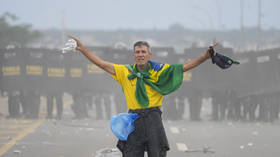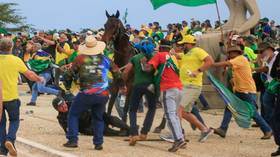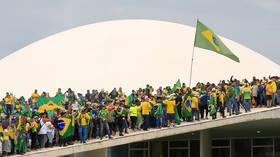Brazil riots show the ‘Trump Effect’ in action

For the second time now, January has become a special month in which people in a major democratic country are incited to violence against key government institutions.
In Brazil, thousands of supporters of former Brazilian president Jair Bolsonaro who can’t come to grips with his narrow loss in the recent presidential election stormed Congress, the Supreme Court, and Brazil’s presidential palace on Sunday. This happened one week after President Luiz Inácio “Lula” da Silva was inaugurated on January 8, which is notably just two days after January 6, the date on which in 2021 supporters of former US president Donald Trump stormed the Capitol building.
Now, there are a few differences apart from that date, including the fact that Bolsonaro has apparently fled to Florida – that is, he wasn’t present for the attacks – and did not incite the crowd. To his credit, he actually denounced the rioters publicly on Twitter, but it should be noted that Brazilian authorities are reportedly seeking his extradition, though no official request has been made yet. The Brazilians also infiltrated more buildings than their US counterparts and Lula was already officially inaugurated when they did it.
According to reports, police quickly regained control of the situation and Lula has sworn to punish the perpetrators of this senseless act of violence. He said the situation was unprecedented and described the protestors as “vandals and fascists.” And he also teed off against relevant security forces for their “incompetence, bad faith or malice” for failing to stop the rioters from entering government buildings.
Despite some superficial details being different and, of course, the president reacting in a different way, it still harkens back to the Capitol riots in 2021 in what we might call the ‘Trump Effect’. After all, the comparisons between the former US shot-caller and his Brazilian counterpart were there. Bolsonaro has been dubbed the ‘Tropical Trump’ for his crude right-wing politics and enjoys a similar cult of personality as his orange Floridian neighbor.
Like Trump, Bolsonaro over-hyped his left-wing challengers, calling them communists and socialists and accusing them of being radically atheist. The Brazilian politician even said Lula planned to close churches (even though he made overtures to the Catholic community) and his supporters, in some cases, begged the military to intervene to stop Lula from becoming president, effectively re-instituting Brazil’s military dictatorship.
Not only is Bolsonaro a Trump-like figure, Brazil is also similar to the US in various ways. For one, Brazil is a deeply polarized country. Lula won the contest with 50.9% of the vote to incumbent president Jair Bolsonaro’s 49.1%, which is a pretty narrow margin.
Second, Lula won this contentious election by pulling a lot of votes from people in the center. And even if he actually accomplished that, not all of these folks voted for his Workers’ Party (PT) beyond him. In effect, Bolsonaro’s Liberal Party (PL) is the largest in both chambers of the Brazilian Congress, controls key governorships across the country and enjoys wide support. It’s almost like the US Republican Party except Bolsonarismo strongly – and I mean strongly – over-performed relative to polls all across the country.
Finally, another critical similarity between January 6 and January 8 is the role of disinformation. As stated before, Bolsonaro fled to Florida after losing his re-election bid and did not participate in the formal changing of the guard ceremonies. He even questioned the validity of the country’s electoral process, as Donald did in Washington.
Prior to the election, he made claims that Brazil’s electronic voting system was vulnerable to fraud. And that sparked an entire Brazilian “stop the deal” movement, even though the legal challenge to do so by the Bolsonaro camp was thrown out of court. Disinformation was rampant and large-scale protests broke out just after the election results were finalized, with Bolsonaro supporters alleging election impropriety.
The question that January 8 now raises is this: Will we see violent putsch attempts every time an election doesn’t go the right’s way in major democracies around the world? It already happened in the United States, supposedly the world’s model of democracy, and now it’s happened in another large democracy, Brazil. We might indeed be seeing the beginning of a ‘Trump Effect’, in which the global right has been inspired by those Capitol rioters from January 6, 2021 and wholeheartedly believe in a conspiracy that threatens them and their political values.
It shows a further breakdown in the entire Western system of ‘democracy’, in which a significant amount of the population doesn’t even believe in it to the point that they consider it illegitimate. And they hold that view so strongly that they’re willing to break the law and risk their freedom to do something about it.
The statements, views and opinions expressed in this column are solely those of the author and do not necessarily represent those of RT.















